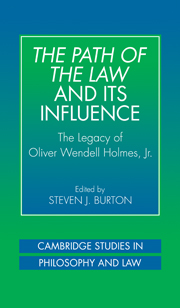Book contents
- Frontmatter
- Contents
- Acknowledgments
- List of Contributors
- The Path of the Law and Its Influence
- Introduction
- 1 Law as a Vocation: Holmes and the Lawyer's Path
- 2 The Bad Man and the Good Lawyer
- 3 Why Practice Needs Ethical Theory: Particularism, Principle, and Bad Behavior
- 4 Theories, Anti-Theories, and Norms: Comment on Nussbaum
- 5 Traversing Holmes's Path toward a Jurisprudence of Logical Form
- 6 Holmes on the Logic of the Law
- 7 Holmes versus Hart: The Bad Man in Legal Theory
- 8 The Bad Man and the Internal Point of View
- 9 Oliver Wendell Holmes, Jr., and William James: The Bad Man and the Moral Life
- 10 Emerson and Holmes: Serene Skeptics
- 11 The Path Dependence of the Law
- 12 Changing the Path of the Law
- 13 Holmes, Economics, and Classical Realism
- 14 Comment on Brian Leiter's “Holmes, Economics, and Classical Realism”
- Appendix: The Path of the Law
- Index
7 - Holmes versus Hart: The Bad Man in Legal Theory
Published online by Cambridge University Press: 22 October 2009
- Frontmatter
- Contents
- Acknowledgments
- List of Contributors
- The Path of the Law and Its Influence
- Introduction
- 1 Law as a Vocation: Holmes and the Lawyer's Path
- 2 The Bad Man and the Good Lawyer
- 3 Why Practice Needs Ethical Theory: Particularism, Principle, and Bad Behavior
- 4 Theories, Anti-Theories, and Norms: Comment on Nussbaum
- 5 Traversing Holmes's Path toward a Jurisprudence of Logical Form
- 6 Holmes on the Logic of the Law
- 7 Holmes versus Hart: The Bad Man in Legal Theory
- 8 The Bad Man and the Internal Point of View
- 9 Oliver Wendell Holmes, Jr., and William James: The Bad Man and the Moral Life
- 10 Emerson and Holmes: Serene Skeptics
- 11 The Path Dependence of the Law
- 12 Changing the Path of the Law
- 13 Holmes, Economics, and Classical Realism
- 14 Comment on Brian Leiter's “Holmes, Economics, and Classical Realism”
- Appendix: The Path of the Law
- Index
Summary
Theory versus Anti-Theory
In The Path of the Law Oliver Wendell Holmes advances a number of propositions about the law that have a distinctly theoretical flavor to them. The following six seem to be the principal ones:
Law is properly characterized in terms of prediction; more particularly, it is to be characterized by reference to predictions about the use of court-sanctioned force. “The object of our study, then, is prediction, the prediction of the incidence of the public force through the instrumentality of the courts” (457). “The prophecies of what the courts will do in fact, and nothing more pretentious, are what I mean by the law” (461).
Law is properly characterized from the point of view of what Holmes calls the “bad man.” “If you want to know the law and nothing else, you must look at it as a bad man, who cares only for the material consequences which such knowledge enables him to predict, and not as a good one, who finds his reasons for conduct, whether inside the law or outside of it, in the vaguer sanctions of conscience” (459).
The predictions mentioned in proposition 1, or at least the means for making these predictions, are found in case reports, statutes, and legal treatises. “In these sybylline leaves are gathered the scattered prophecies of the past upon the cases in which the axe will fall. These are what properly have been called the oracles of the law” (457). “The number of our predictions when generalized and reduced to a system is not unmanageably large. They present themselves as a finite body of dogma which may be mastered within a reasonable period of time” (458).
- Type
- Chapter
- Information
- The Path of the Law and its InfluenceThe Legacy of Oliver Wendell Holmes, Jr, pp. 158 - 196Publisher: Cambridge University PressPrint publication year: 2000
- 6
- Cited by



